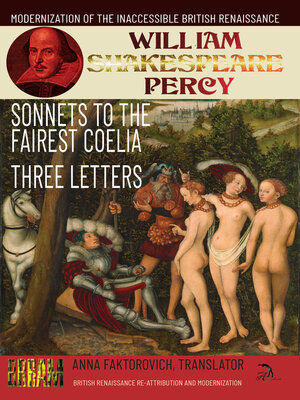Sonnets to the Fairest Coelia and Three Letters
ebook ∣ British Renaissance Re-Attribution and Modernization, Volume 3 · British Renaissance Re-Attribution and Modernization
By William Percy

Sign up to save your library
With an OverDrive account, you can save your favorite libraries for at-a-glance information about availability. Find out more about OverDrive accounts.
Find this title in Libby, the library reading app by OverDrive.



Search for a digital library with this title
Title found at these libraries:
| Library Name | Distance |
|---|---|
| Loading... |
The only collection of sonnets actually written by William ("Shakespeare") Percy. Discover a collection of extraordinary sonnets that have been nearly invisible to scholars and students alike because they were misunderstood or deliberately suppressed by censors of the canon. As the introduction explains, one of its only preceding reprints was an 1818 edition that was prefaced by its editor as a poetic failure that was a typical example of "the court style". A close analysis of Coelia's poetic structure and linguistics proves this collection to be one of the best examples of metered and rhymed verse from the Renaissance. The real reason for the cold critical reception that has ostracized Coelia becomes apparent in the synopsis of the content of the unified narrative these sonnets relate. Coelia is a plea addressed to Elizabeth I for ending the Buggery Act that sentenced homosexuals to death. Sonnet XI refers to a suicidal sacrifice, and Percy was indeed risking his life when he put his own name in the byline of this poetic appeal. Because he was writing under his own name, Percy subverts some of this homosexual subject-matter by instead referring to ugly or masculine features behind a feminine or cross-dressing mask in Sonnet XIII. Each sonnet explores a new philosophical dilemma, with beautiful descriptions, complex mythological allusions, and tragically romantic appeals for love and sympathy. Percy was the dominant ghostwriter of most of the "Shakespeare"-bylined tragedies, but he only wrote a few pieces out of the "Shakespeare"-bylined multi-ghostwriter collection called Sonnets (1609); thus, readers have not really read a full collection of sonnets by "Shakespeare" the Tragedian until they explore Coelia.







